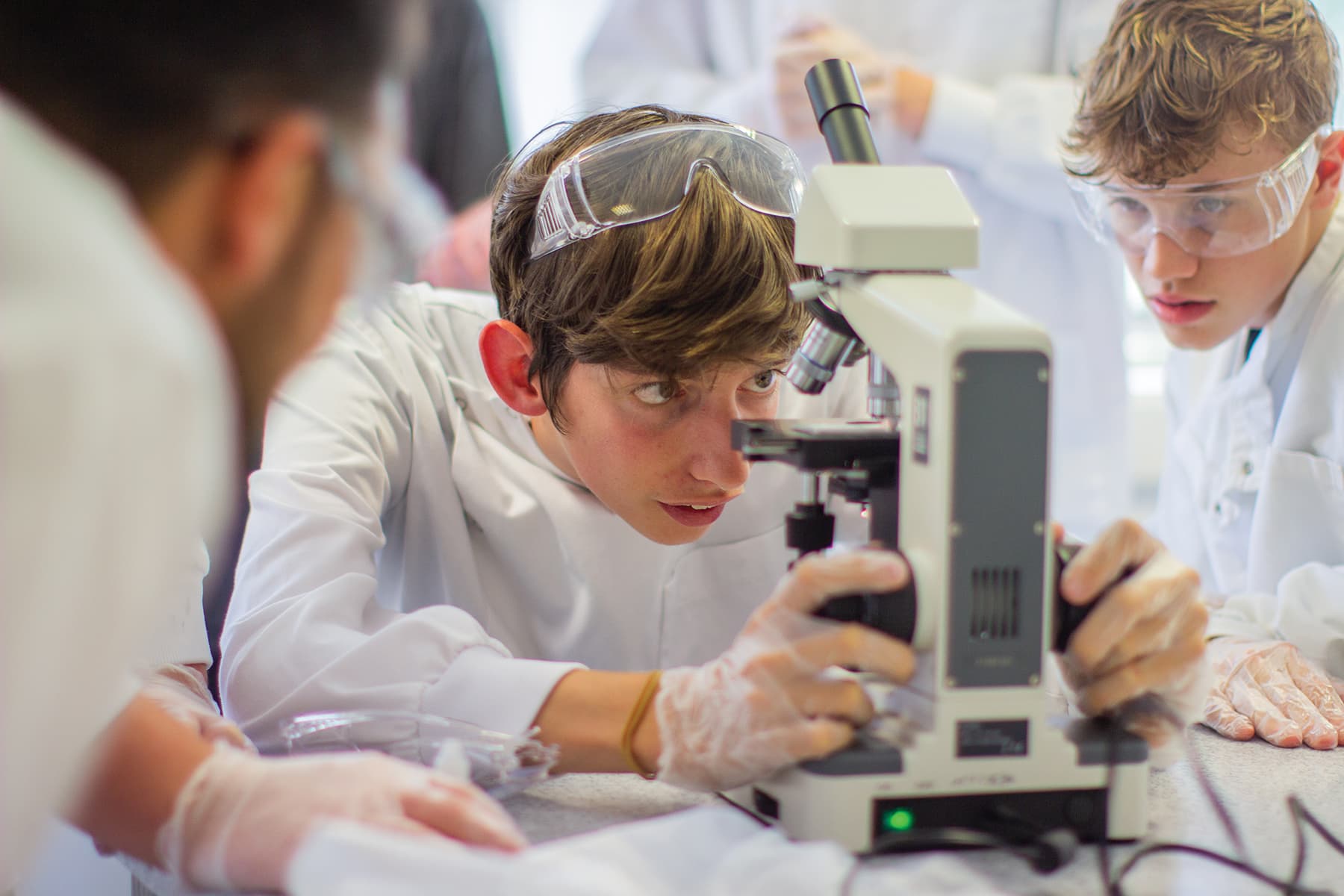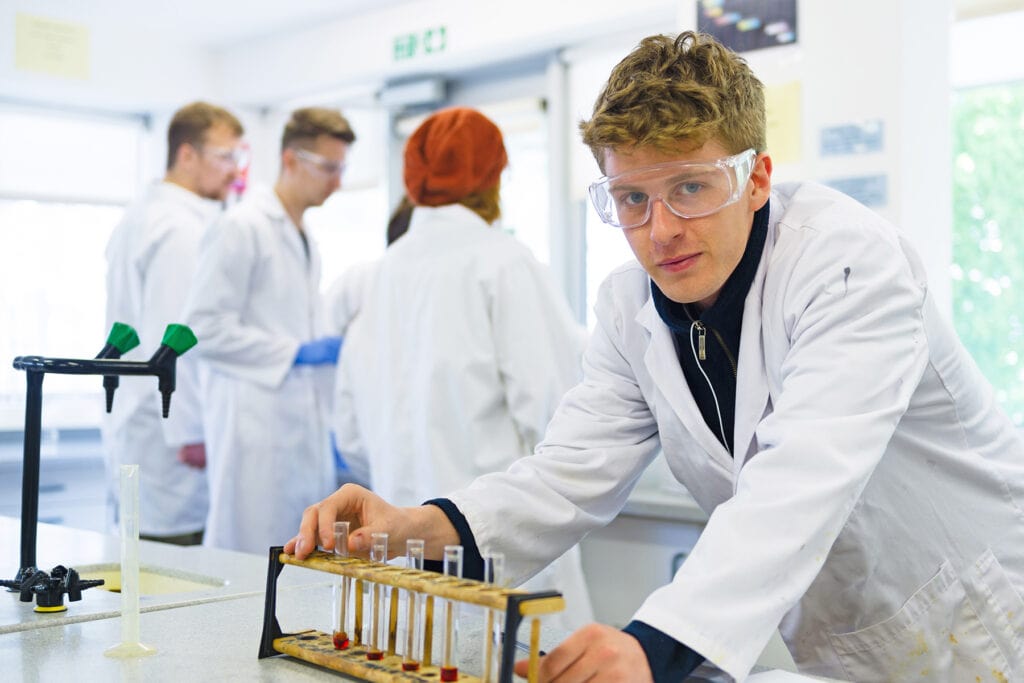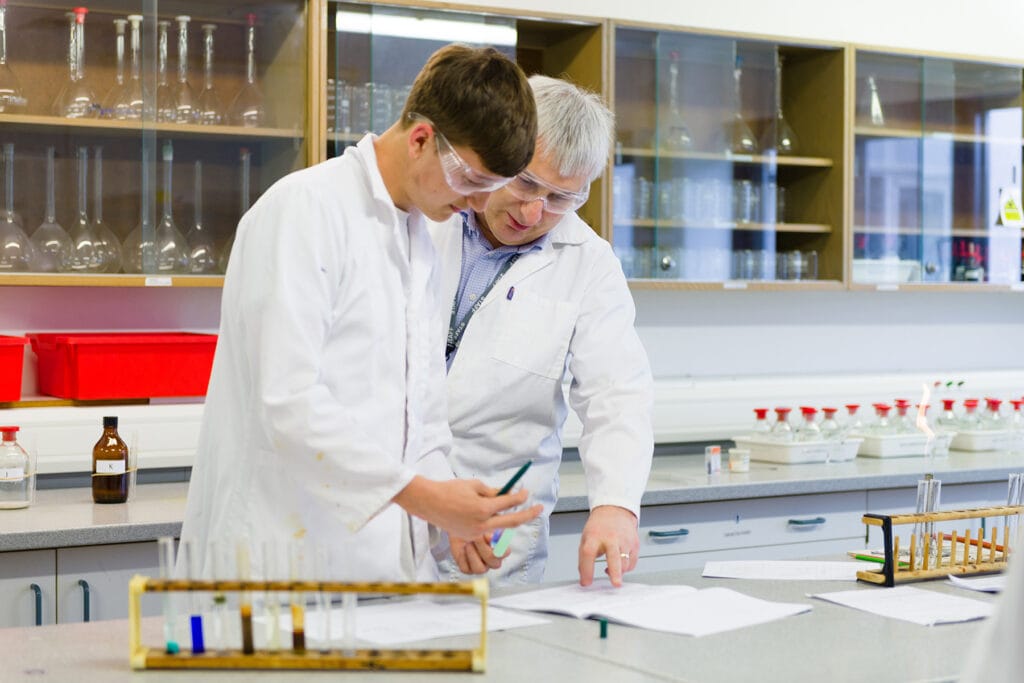New students starting in September: You can find more information about Induction days and submitting your GCSE results in our Start of Year Guide.
Why Choose This Course?
Do you enjoy using scientific knowledge to solve problems? Are you keen to learn how to piece together evidence and data to reach valid conclusions? The field of analytical and forensic science is vast and is not just limited to crime scene investigation. Scientists use the same skills on a daily basis to attempt to solve current issues. This course is designed to give you a detailed understanding of aspects of science with an emphasis on the skills and knowledge used in the fields of analytical and forensic science. You will study a range of core scientific units as well as specialist units relating to forensics.
Over the two years of study, you will develop the scientific knowledge and practical and problem-solving skills to enable you to progress into employment or onto a range of Higher Education courses. Throughout the course you will develop your scientific understanding and practical skills through a series of assignments and challenging investigations which utilise some of the techniques used by crime scene investigators and analytical and forensic scientists in the workplace, including collecting evidence from crime scenes, and analysis of evidence through chemical spectroscopy, fingerprint analysis, chemical and biological testing.
Apply for this course
Start date: 08/09/2025
TOP COURSE HIGHLIGHTS
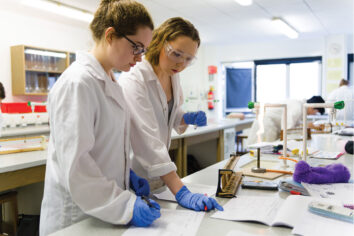
Develop work-related skills
You will be taught by specialist scientists and develop your skills in practical science using a range of specialist scientific equipment which will prepare you for employment or further study.
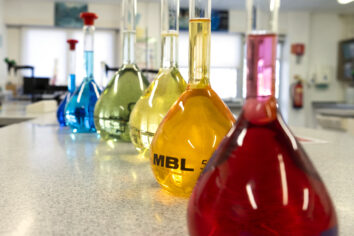
Advice on careers and progression
Our students progress onto a wide range of careers and university courses including forensic science, criminology, paramedic science, psychology and a range of employment and apprenticeships.

Crime Scene Investigation
You will complete a crime scene investigation and an individual project similar to the type of work an employer may give you. You will conduct research to plan your investigation, carry it out and analyse and evaluate what you have done.
WHAT WILL I LEARN?
The course aims to give you a varied learning experience and will be a combination of a student-centred approach to learning, involving research for assignments, visits, guest speakers, lectures, group work and discussions.
An experienced team of lecturers, many of whom have worked in scientific industries and forensic sciences, will support your learning. You will need to be prepared to work hard independently, carry out in-depth research and use a variety of information sources.
You will study a range of core and specialist units over the two years of the course. The specialist units have been carefully selected to keep your options for further study as broad as possible whilst giving you specialist knowledge of key areas.
The course is split into two years, each year being equivalent to 1.5 A levels. At the end of the two year course you will receive a qualification which is equivalent to 3 A levels.
Successful completion of Year 1 will enable you to progress onto year 2.
Year 1: Foundation Diploma in Applied Science
The emphasis of year 1 is to provide you with the knowledge and skills to be able to apply what you learn to analytical and forensic science situations. To enable you to achieve the Foundation Diploma you will study core and specialist units covering some of the following themes: Principles and Applications of Science (biology, chemistry and physics), Practical Scientific Procedures and Techniques, Laboratory Techniques, Investigative Project, Scientific Investigative Skills, Physiology of Human Body Systems and Microbiology and Microbiological Techniques.
Year 2: Extended Diploma in Applied Science (Analytical and Forensic Science)
Year 2 will enable you to see how science is used in an analytical and forensic context and to relate your studies in year 1 to the fields of analytical and forensic science. Again, you will study a mixture of core and specialist units covering some of the following themes: Forensic Evidence Collection, Forensic Fire Investigation, Contemporary Issues in Science, Genetics and Genetic Engineering and Practical Chemical Analysis.
WHERE WILL IT TAKE ME?
Scientific skills are always in demand in the workplace and a wide range of careers are possible including forensic laboratory work or scenes of crime work. The course can also lead to a variety of science-based courses at Higher Education including chemical and biological sciences, environmental sciences, criminology, and forensic science, as well as related work-based training or employment.
ENTRY REQUIREMENTS
A minimum of four GCSEs or equivalent at grade 4 including Maths and English. You should also have the following grades in Science: Chemistry (4), Biology (4) and Physics (4) or Combined Science (4,4).
ASSESSMENT ARRANGEMENTS
Your achievement in this subject is dependent upon excellent attendance, punctuality and effort. You will learn in a friendly atmosphere, using a variety of assessment methods.
Assessment is by a combination of assignments and controlled assessments. Assignments are internally set by the team and externally moderated by Pearson (Edexcel). There will be an examination for one unit each year (approx. 18% of final grade) and a controlled assessment, which are both externally set and marked. Assignments are graded at pass, merit and distinction level and may take any of the following formats: written practical reports, portfolios of work, presentations, written research assignments and individual practical investigations.
There is a strong emphasis on the acquisition of skills that will prepare you to study at university or enter employment. The grades awarded are given points and are converted into a final grade at the end of the course which will range from a Pass, Pass, Pass (PPP) to Distinction*, Distinction*, Distinction* (D*D*D*). This grade will be converted into UCAS points at the end of the course. Typical university offers require final grades of Distinction, Merit, Merit (DMM) and above.
INFORMATION & SUPPORT
We encourage all students to read widely and conduct their own research into the topics they are studying. You will be expected to undertake at least 12 hours of independent study time per week. There is a wide range of support material available in the Learning Resource Centres and on the course Moodle site. You will also regularly review your own performance in 1:1 sessions with your tutor. Throughout the year you will be able to access additional support through drop-in sessions, dedicated revision workshops, tailored 1-to-1 provision, as well as a variety of additional opportunities to stretch and challenge the most able students. We encourage you to proactively engage with the support available in order to reach your full potential.
Meet the staff, tour the campus and find out about life as a student at one of the best colleges in the country.
